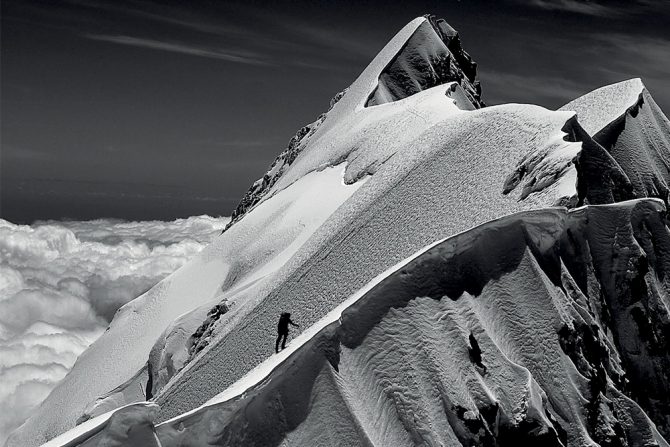Nic Low (writer of an upcoming book described as "a bicultural response to the Southern Alps") opened the session by asking author Laurence Fearnley to read a passage from To the Mountains, her recent anthology of alpine writing co-edited with Paul Hersey. She chose Young, short, and loving it by Rebecca Smith, a short account of the mad rush of preparing for a weekend in the mountains while she was still at high school.
Laurence explained that the anthology was consciously structured in the shape of a mountain, beginning at sea level, rising towards the bush, glaciers and saddles, up to the peaks and the epics, and then coming down and reflecting. There was also an interesting shift in the style of writing used from generation to generation, with earlier (mostly British) climbers in Aotearoa using very romantic language to talk up the scale of their climbs, compared to the more laconic writing of Kiwi climbers later on:
"The more deadpan the description the harder the climb," joked Nic.
Most writing was also limited to those of a certain wealth and class until access to the mountains became easier and mountaineering became more democratic in the 40s and 50s. After that came the 70s hard-man stories, full of machismo, before getting into more reflective and gentle narratives like Aat Vervoorn.
Laurence warned that this book is definitely not of the most extreme mountaineering experiences, so don't look to it for the top 100 climbs. When selecting material they consciously expanded the boundaries from those first ascents and difficult routes (which tends to favour one particular voice), and looked at the experiences of family groups, women who used guides early on, the guides themselves, and Māori experiences in the mountains.
When you include these people, those who enjoy going into the mountains to connect with the beautiful landscape or as an escape from the city with friends, then you realise how many people participate — people who would be overlooked if only looking for those at the peak of New Zealand mountaineering.
Some of these experiences make difficult reading. Anyone even tangentially involved in mountain climbing will know of someone who has perished in the hills, and some of the extracts address that loss along with other miserable experiences on the mountains. "Why do we love suffering so much?" wondered Nic, but of course the flip side is the emotional connection that being in the outdoors can provide, the joy of a successfully completed challenge.
Some pieces in the anthology had me laughing out loud: a group of climbers lugging a bunch of tins of various luxury food items along on their trip, only to open each one to find the same disappointing can of kidneys; Jill Tremain's 'Letter to Mavis Davidson' about being caught out by bad weather for several days and finding her decades-old food stash, getting drunk on the tin of apricots and trying everything to make the stale biscuits more palatable.
These highs and lows are all documented in To the Mountains, the latest in our whakapapa of alpine climbing and literature, so if you're an avid mountaineer, tramper, climber, or simply interested in some gripping stories of the New Zealand outdoors, I'd recommend having a look. No crampons required.
Find works in our collection by:
Follow our coverage of WORD Christchurch Festival 2018




Add a comment to: To the Mountains: WORD Christchurch Festival 2018